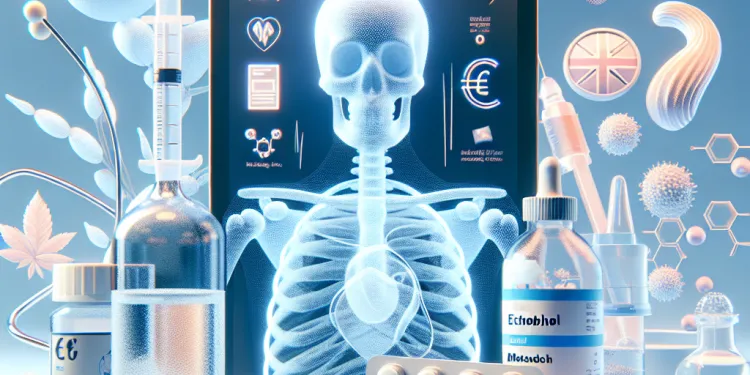
Find Help
More Items From Ergsy search
-

How does methanol poisoning differ from ethanol poisoning?
Relevance: 100%
-
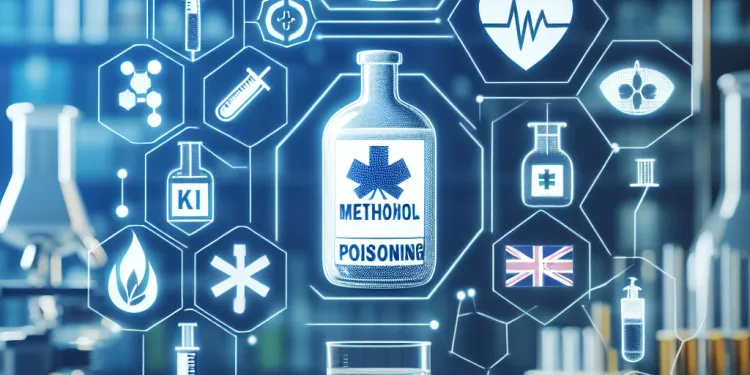
What is methanol poisoning?
Relevance: 87%
-

Can methanol poisoning be treated?
Relevance: 84%
-

What is the role of ethanol in the treatment of methanol poisoning?
Relevance: 78%
-

What are the differences between methanol and ethanol?
Relevance: 75%
-

Can methanol poisoning cause permanent damage?
Relevance: 75%
-

What are the symptoms of methanol poisoning?
Relevance: 74%
-

What should you do if you suspect methanol poisoning?
Relevance: 73%
-

Is dialysis used in methanol poisoning cases?
Relevance: 73%
-

How can methanol poisoning be prevented?
Relevance: 68%
-

How quickly do symptoms of methanol poisoning appear?
Relevance: 68%
-

Why is methanol dangerous to humans?
Relevance: 65%
-

Why is methanol sometimes found in illegally produced alcohol?
Relevance: 54%
-

What is fomepizole and how does it work?
Relevance: 48%
-

What types of visual disturbances are associated with methanol poisoning?
Relevance: 47%
-

Is there a specific test to diagnose methanol poisoning?
Relevance: 47%
-

What first aid measures can be taken in case of methanol exposure?
Relevance: 34%
-
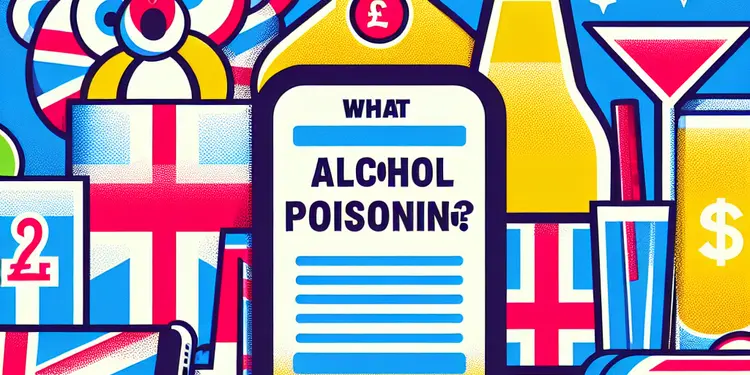
What is alcohol poisoning?
Relevance: 34%
-

What are the symptoms of Bacillus cereus food poisoning?
Relevance: 29%
-

Are there any long-term effects of rice food poisoning?
Relevance: 28%
-
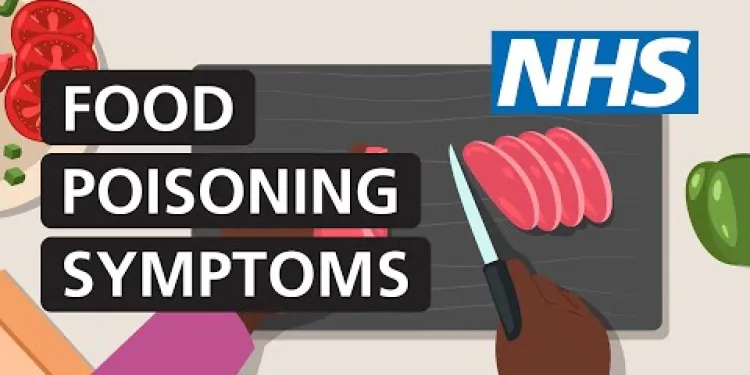
How to tell if you have food poisoning (symptoms) | NHS
Relevance: 28%
-

Why is rice particularly risky for food poisoning?
Relevance: 27%
-

What should I do if I suspect food poisoning from rice?
Relevance: 26%
-

Blood Poisoning - Sepsis
Relevance: 24%
-

Are there any poisonous spiders in the UK?
Relevance: 24%
-
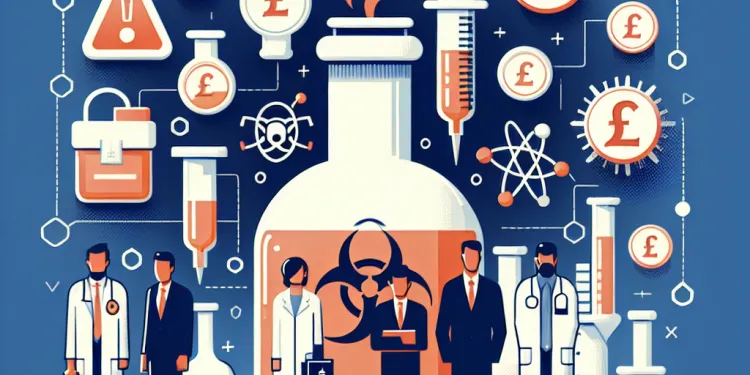
What professions are at higher risk of methanol exposure?
Relevance: 23%
-

What are common methods for making cannabis extract?
Relevance: 15%
-

Having chemotherapy and other treatments in the Day Treatment Unit
Relevance: 15%
-

Is there a treatment for measles?
Relevance: 15%
-

Is there a treatment for measles?
Relevance: 14%
-

Are chiropractic treatments safe?
Relevance: 14%
-

Is Botox treatment expensive?
Relevance: 14%
-

Are chiropractic treatments painful?
Relevance: 14%
-

What is the treatment for appendicitis?
Relevance: 14%
-

Eating disorders: treatment
Relevance: 14%
-

Is Paillon treatment a form of chemotherapy?
Relevance: 14%
-

What is Paillon treatment for cancer?
Relevance: 14%
-

Who developed the Paillon treatment?
Relevance: 14%
-

How is Paillon treatment administered?
Relevance: 14%
-

BSL - Treatments for insomnia
Relevance: 14%
The Role of Ethanol in Methanol Poisoning Treatment
Methanol poisoning is a serious medical condition that can occur due to the ingestion of methanol, a toxic alcohol commonly found in industrial and household products such as antifreeze, paint thinners, and windshield wiper fluid. Methanol itself is not highly toxic; however, it is metabolized in the liver to formaldehyde and then to formic acid, both of which are highly toxic and can result in metabolic acidosis, visual disturbances, and other critical conditions if not treated promptly.
How Ethanol Works as an Antidote
Ethanol plays a critical role in the treatment of methanol poisoning. The primary mechanism of action involves the inhibition of methanol metabolism to its toxic metabolites. Both methanol and ethanol are metabolized by the enzyme alcohol dehydrogenase. However, ethanol has a much higher affinity for this enzyme compared to methanol. By administering ethanol, the enzyme is competitively inhibited from converting methanol into formaldehyde and formic acid, thereby reducing the toxic effects.
This competitive inhibition allows the body to excrete methanol in its unmetabolized form through the kidneys and lungs, reducing the concentration of methanol in the blood and minimizing toxic exposure to tissues. Ethanol, therefore, acts as a preferred substrate for alcohol dehydrogenase, giving the body more time to clear methanol naturally.
Ethanol Administration
The administration of ethanol as a treatment for methanol poisoning can be achieved through oral or intravenous routes, depending on the severity of the poisoning and the patient's condition. In cases where intravenous administration is not feasible, oral administration of ethanol-containing products such as spirits may be considered. However, precise dosing is crucial to ensure effective inhibition without causing ethanol intoxication.
In hospitals, intravenous ethanol is preferred as it allows for controlled dosage and rapid attainment of therapeutic blood levels. The goal is to maintain an ethanol concentration in the blood that is sufficient to inhibit alcohol dehydrogenase without causing additional harm.
The Use of Fomepizole
While ethanol is a traditional treatment option, fomepizole has gained popularity as it specifically inhibits alcohol dehydrogenase without the intoxicating effects of ethanol. In the UK, fomepizole is preferred when available, although ethanol remains a viable alternative, especially in situations where fomepizole is not readily accessible.
Overall, the role of ethanol in methanol poisoning treatment is critical, especially in contexts where rapid intervention is needed to prevent severe toxicity. With proper medical oversight, ethanol can effectively mitigate the damage caused by methanol poisoning.
The Role of Ethanol in Methanol Poisoning Treatment
Methanol poisoning is when someone gets sick from drinking methanol. Methanol is in things like antifreeze and paint thinners, which you might find at home or in factories. Methanol by itself is not very harmful. But when it gets into the body, it turns into bad chemicals that can make you very sick. These chemicals can cause problems like blurry vision or make your body feel funny inside if you don’t get help quickly.
How Ethanol Works as an Antidote
Ethanol helps treat methanol poisoning. It stops methanol from changing into bad chemicals in your body. Both methanol and ethanol need a special helper in the body called an enzyme to change. Ethanol is better at using this helper than methanol. So when you take ethanol, it keeps methanol from turning into harmful stuff. This makes methanol leave the body safely through the kidneys and lungs. Ethanol buys the body time to get rid of methanol.
Ethanol Administration
If someone has methanol poisoning, doctors can give ethanol to help. They can give it as a drink or through a needle in the vein, depending on how sick the person is. If using a needle is not possible, they might use drinks with ethanol. But it’s important to give just the right amount, or else the person might get sick from too much ethanol.
In hospitals, doctors like to use a needle because it’s easier to control how much ethanol the person gets. The goal is to give just enough ethanol to help without making the person sick from it.
The Use of Fomepizole
Fomepizole is another medicine that can stop the harmful changes in methanol. It doesn’t make you feel drunk like ethanol. In the UK, doctors like to use fomepizole when they have it. But ethanol is still good to use if fomepizole is not available.
Ethanol is important for treating methanol poisoning. This is especially true when doctors need to act fast to stop someone from getting very sick. With the right medical care, ethanol can help prevent bad effects from methanol poisoning.
Frequently Asked Questions
Useful Links
This website offers general information and is not a substitute for professional advice.
Always seek guidance from qualified professionals.
If you have any medical concerns or need urgent help, contact a healthcare professional or emergency services immediately.
Some of this content was generated with AI assistance. We’ve done our best to keep it accurate, helpful, and human-friendly.
- Ergsy carfully checks the information in the videos we provide here.
- Videos shown by Youtube after a video has completed, have NOT been reviewed by ERGSY.
- To view, click the arrow in centre of video.
- Most of the videos you find here will have subtitles and/or closed captions available.
- You may need to turn these on, and choose your preferred language.
- Go to the video you'd like to watch.
- If closed captions (CC) are available, settings will be visible on the bottom right of the video player.
- To turn on Captions, click settings .
- To turn off Captions, click settings again.
More Items From Ergsy search
-

How does methanol poisoning differ from ethanol poisoning?
Relevance: 100%
-

What is methanol poisoning?
Relevance: 87%
-

Can methanol poisoning be treated?
Relevance: 84%
-

What is the role of ethanol in the treatment of methanol poisoning?
Relevance: 78%
-

What are the differences between methanol and ethanol?
Relevance: 75%
-

Can methanol poisoning cause permanent damage?
Relevance: 75%
-

What are the symptoms of methanol poisoning?
Relevance: 74%
-

What should you do if you suspect methanol poisoning?
Relevance: 73%
-

Is dialysis used in methanol poisoning cases?
Relevance: 73%
-

How can methanol poisoning be prevented?
Relevance: 68%
-

How quickly do symptoms of methanol poisoning appear?
Relevance: 68%
-

Why is methanol dangerous to humans?
Relevance: 65%
-

Why is methanol sometimes found in illegally produced alcohol?
Relevance: 54%
-

What is fomepizole and how does it work?
Relevance: 48%
-

What types of visual disturbances are associated with methanol poisoning?
Relevance: 47%
-

Is there a specific test to diagnose methanol poisoning?
Relevance: 47%
-

What first aid measures can be taken in case of methanol exposure?
Relevance: 34%
-

What is alcohol poisoning?
Relevance: 34%
-

What are the symptoms of Bacillus cereus food poisoning?
Relevance: 29%
-

Are there any long-term effects of rice food poisoning?
Relevance: 28%
-

How to tell if you have food poisoning (symptoms) | NHS
Relevance: 28%
-

Why is rice particularly risky for food poisoning?
Relevance: 27%
-

What should I do if I suspect food poisoning from rice?
Relevance: 26%
-

Blood Poisoning - Sepsis
Relevance: 24%
-

Are there any poisonous spiders in the UK?
Relevance: 24%
-

What professions are at higher risk of methanol exposure?
Relevance: 23%
-

What are common methods for making cannabis extract?
Relevance: 15%
-

Having chemotherapy and other treatments in the Day Treatment Unit
Relevance: 15%
-

Is there a treatment for measles?
Relevance: 15%
-

Is there a treatment for measles?
Relevance: 14%
-

Are chiropractic treatments safe?
Relevance: 14%
-

Is Botox treatment expensive?
Relevance: 14%
-

Are chiropractic treatments painful?
Relevance: 14%
-

What is the treatment for appendicitis?
Relevance: 14%
-

Eating disorders: treatment
Relevance: 14%
-

Is Paillon treatment a form of chemotherapy?
Relevance: 14%
-

What is Paillon treatment for cancer?
Relevance: 14%
-

Who developed the Paillon treatment?
Relevance: 14%
-

How is Paillon treatment administered?
Relevance: 14%
-

BSL - Treatments for insomnia
Relevance: 14%


